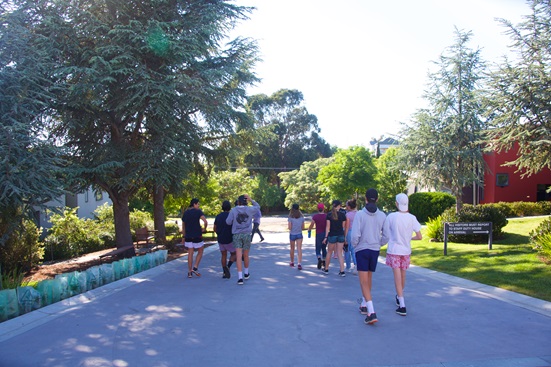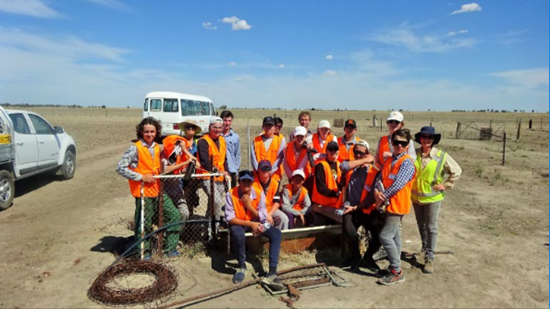
The Wesley at Clunes program is a residential learning experience for Year 9 students from Wesley’s three Melbourne campuses. Each term, one-quarter of our Year 9s experience the program in the township of Clunes, 140 kilometres north-west of Melbourne.
Living in houses of up to eight, the students take responsibility for household budgeting and domestic duties. The Year 9 program blends experiential learning, social and emotional learning, community engagement, the arts, sustainability and interdisciplinary learning within the overall continuum of the wider International Baccalaureate Middle Years Programme at Wesley. A substantial curriculum element is the Individual Project, addressing a topic relevant to the local area, chosen by each student for investigation with a focus on primary sources.
Importantly, there are no classrooms and no textbooks. Learning occurs everywhere, across a range of settings, contexts and physical locations: first and foremost in the students’ houses, but also in and around Clunes and the central Victorian goldfields region beyond. What do students learn from the experience? We interviewed 10 of them to find out.
1. Wesley's core principles of learning; learning to know, learning to do, learning to live with and learning to be, through caring for self, others and place; are at the core of the Wesley at Clunes program. What do those principles of learning look like in reality at Clunes?
‘The Individual Project helps you learn so much more, because it focuses you on finding out (about your chosen topic) from primary experiences, rather than from reading about it.’

‘You learn to plan because you’re the one driving (the Individual Project), and you learn because you’re able to really focus on something of interest.’
‘The Individual Project helps you to be disciplined and have good time management.’
‘When you choose to pursue something you’re interested in, you’re more prepared to do the hard work.’
‘I think you realise that you learn a lot from simple things like shopping and cleaning. You’re changed by this experience. You become a lot more independent.’
‘You become more disciplined and more responsible.’
‘Like the running, for example. I don’t really like getting up so early, but it teaches you to just do it and you’re kind of dragged along because there are about 30 others doing it with you every morning.’
‘You definitely also learn from your mistakes.’
2. What have you learned about collaboration?
‘Collaborating here is a bit different. If you don’t sort things out in your house, it really matters. If someone hasn’t done their turn (for example, at cooking or cleaning), it really shows. We’ve learned how important it is to have a few rules in place.’
‘It’s a team effort up here. You learn that if you help others out, you know they’ll help you.’
‘It’s not all about issues or problems. In my house we haven’t really had any conflict, but we’ve learned about compromise.’
‘The biggest takeaway (for me) is how to build relationships.’
‘You learn from experience in your house. You learn, for example, how to have difficult conversations (when something isn’t working out).’
‘You really do learn by living together. A good example is learning skills in having difficult conversations. You learn that it’s better to have those conversations as a group (rather than one to one).’
3. How would you describe your teachers?
'The teachers are really good here, they help you to learn how to take care of yourselves.’
‘They care a lot about your wellbeing, like they’ll notice if you’re having an off day, and they’ll help you deal with that.’
‘I guess we don’t think of our teachers as teachers. You have a much closer relationship with them and understand them a lot more. You know you can always talk to them.’
4. You're away from family, your life in Melbourne and your phone here at Clunes, which in some ways is like being quarantined. How have you dealt with that?
You do have to leave things behind, but you also have other opportunities, like Friday Community Service, where you get to work with the people here, or become a part of the footy club.’
‘You learn what you take for granted at home – things like being energy conscious, watching how much water you use.’
‘It’s an eye-opener to how much your parents do for you.’
‘We have pretty strict rules on what we can buy, and we actually eat well; we eat regular meals and not so many snacks in the afternoon. Most afternoons now I make myself some porridge. I’m less interested in sweet snacks.’
‘It’s been really nice not having a phone and not being so connected by social media. Talking to each other is so different. We have a tradition that we get together in someone’s room before bed and talk; we’ve decided we’re going to keep doing that (using social media) once a week after we get home.’
‘(Being away from family) does change you. I’ve noticed how much I love my family.’
5. So would you recommend Clunes to others?
'Yes.’ ‘Yes.’ ‘Yes.’ ‘Yes.’ ‘Yes.’ ‘Yes.’ ‘Yes.’ ‘Yes.’ ‘Yes.’ ‘Yes.’
